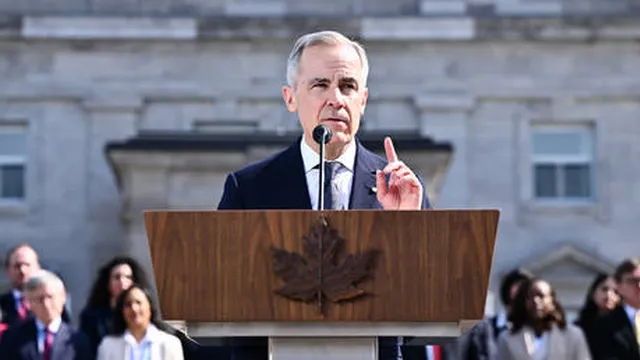
Trump urges Canadians to vote for him and become America’s 51st state
2025-04-29 00:00- President Donald Trump encouraged Canadians to elect him as their leader and proposed that Canada should become the 51st state of the USA.
- His controversial remarks drew condemnation from both major Canadian political parties amid their federal election.
- The proposal sparked discussions on Canada's sovereignty and the negative perception of the U.S. political climate among Canadians.
Express your sentiment!
Insights
In a controversial statement made on his Truth Social platform, President Donald Trump encouraged Canadians to elect him as their leader during the federal election, claiming that Canada would benefit greatly if it became the 51st state of the United States. He reiterated this idea, which he initially proposed months ago, stating that joining the U.S. would lead to increased economic growth, free access without borders, and the elimination of tariffs. His comments sparked swift condemnation from leaders of both the Liberal and Conservative parties in Canada, who argued against any notion of becoming a U.S. state and emphasized their commitment to Canada's sovereignty. Trump’s wild assertions came at a time of significant political tension in the U.S. and Canada. Amid ongoing challenges such as high inflation rates and economic struggles highlighted by the Canadian elections, the suggestion appeared out-of-touch to many Canadians. Polls showed that the race was closely contested between the ruling Liberal Party, led by new leader Mark Carney, and the Conservative Party under Pierre Poilievre. Both parties condemned Trump’s remarks as inappropriate and called for Canadians to prioritize their interests by electing representatives who understand domestic challenges. Furthermore, a survey indicated that around 60% of Canadian adults expressed reluctance to travel to the U.S. this year, largely due to the influence of Trump’s policies and comments on the political environment. This sentiment was further underscored by the fact that many Canadians had canceled their travel plans to the United States, reflecting a growing dissatisfaction with the political atmosphere cultivated by Trump's administration. For many, the idea of Canada becoming a U.S. state is unacceptable and viewed as a threat to their national sovereignty. In light of this, Canadian leaders reiterated their stance that Canada is standalone and does not wish to blend its identity with that of the United States. They conveyed the message that Canadian politics should be left to Canadians and that the country's direction should not be influenced by external propositions. As the Canadian election approached, voters were urged to focus on domestic concerns and the importance of maintaining Canada’s independence in the face of foreign political rhetoric.
Contexts
The relationship between the United States and Canada has undergone significant changes during Donald Trump's presidency, which lasted from January 20, 2017, to January 20, 2021. Traditionally viewed as a stable partnership marked by strong economic, cultural, and political ties, the relationship faced numerous challenges in light of Trump's unconventional approach to international relations. Throughout his tenure, the Trump administration adopted a transactional view of foreign relations, prioritizing bilateral negotiations that often overlooked the complexities of long-standing alliances. This shift in approach led to tensions, particularly in trade policies and border security issues, which have historically been cornerstones of U.S.-Canada relations. One of the major impacts of Trump's presidency on U.S.-Canada relations was the renegotiation of the North American Free Trade Agreement (NAFTA). During his campaign, Trump had criticized NAFTA as a "disaster" and blamed it for job losses in the United States. Consequently, the administration pursued a replacement for this agreement, resulting in the United States-Mexico-Canada Agreement (USMCA), which was signed in November 2018. While this agreement included concessions beneficial to Canada, such as maintaining tariff-free access for Canadian goods, Canada was forced to navigate the complex demands of the U.S. administration, which created a sense of uncertainty regarding trade policies. Additionally, Trump's presidency affected immigration and border security policies that directly impacted Canada. The implementation of stricter immigration policies, a focus on building a wall along the southern border with Mexico, and an overall tone that often vilified immigrants changed the dynamics of border discussions between the two countries. Canada positioned itself as an alternative destination for individuals seeking refuge, further complicating diplomatic relations as the flow of asylum seekers increased at the shared border. There were instances of friction over border enforcement measures, with Canadian officials expressing concerns about the potential fallout from U.S. policies that undermined cooperative border management and safety protocols. Despite these challenges, the relationship between the U.S. and Canada demonstrated resilience during Trump's presidency. Leaders from both nations engaged in dialogues to address emerging issues, including climate change, security, and the COVID-19 pandemic. Following Trump's departure from office, the transition of administration has paved the way for renewed cooperation and collaboration on various fronts, indicating a return to the more traditional partnership characterized by shared values and mutual respect. Nevertheless, the legacy of Trump's presidency and its impact on U.S.-Canada relations continues to be discussed and analyzed as both nations look forward to navigating a post-Trump era.